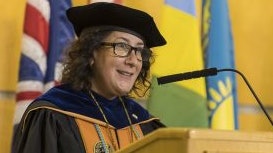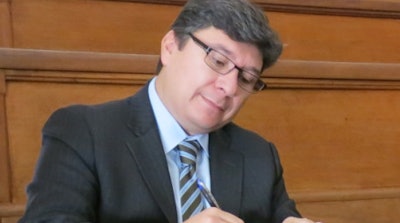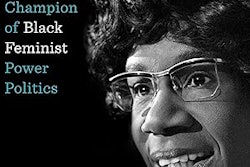In 2019, the Hispanic Association of Colleges and Universities (HACU) newfound Presidential Leadership Academy (La Academia de Liderazgo) dedicated itself to help prepare aspiring leaders and bolster Hispanic representation in higher ed presidencies. Now entering its fifth year, the academy is bigger and stronger than ever.
A “direct response” to the underrepresentation of Hispanic university presidents amid growing Hispanic college student enrollment, the academy opened its doors with the goal of educating and training those in higher education’s upper management such as deans, assistant deans, and vice presidents. The goal was to build these individuals into well-equipped leaders and presidents. It also came with a special focus on training individuals to guide Hispanic-Serving Institutions (HSIs) into the future.
"The program zeroes in on the things that senior administrators need to know to be effective and successful,” says HACU President and CEO Dr. Antonio R. Flores. “It's a whole range of important things — that presidents deal with on a regular basis as senior administrators — that we focused our curriculum on."
To operate well as presidents, administrators must be knowledgeable about a wide range of topics, Flores says, including governance, financial management, public affairs and media, student services and affairs, faculty relations, and school advocacy before elected officials.
Teaching the participants would be La Academia’s faculty of sitting presidents, recently retired presidents, and provosts. The aspiring leaders get a chance to partake in mock presidential interviews and receive feedback.
Through a mix of instruction, seminars, panels, groupwork, social networking, and readings, the fellows can be better prepared to take the reins when the time came.
According to past participants, the academy has delivered. Former fellows — the program is now kicking off its fifth cohort in October 2023 — have praised La Academia for not only teaching them the skills they needed for successful presidencies, but for helping expand their understandings of the landscape and for bringing them together as a tight-knit community.
Starting complications
The program’s inaugural year had not gone as smoothly as officials hoped.
La Academia received solid interest from the get-go, beginning its first year with a cohort of 25 fellows. The plan was for the participants to be able to convene in-person throughout the year, hear from one another, and learn from veterans in the field — those with experience at the helm of institutes of higher learning. However, in 2020, plans diverted due to the COVID-19 pandemic.
"It was a difficult time when we started the program,” Flores says. Many aspects of the academy’s programming had to be moved online and conducted virtually. That the program was able to shift gears so well points to the resiliency, creativity, and innovation of everyone involved, he adds.
 Dr. Suzanne M. Rivera
Dr. Suzanne M. Rivera
"We have a very lively WhatsApp group and we stay in touch that way,” says Rivera, Macalester’s first woman and Latinx president. “We nominate each other for positions. We give each other moral support when people are struggling. We celebrate each other's accomplishments.”
Sitting at the helm of a higher ed institution can be emotionally isolating, so being able to have this wide support network has been incredibly beneficial, Rivera says.
“Because you're the only one in this particular job, and there are very few people who sort of see all aspects of the campus from the vantage point that you're sitting in,” Rivera says. “To have trusted confidants on other campuses, who are supportive, loyal friends who want to see you be your best is a tremendous gift."
When Rivera became part of La Academia, while serving as vice president for research and technology management at Case Western Reserve University in Cleveland, Ohio, she was looking for a greater leadership opportunity.
"I looked upon it as an opportunity to develop the skills and knowledge to compete effectively for a presidency when the time came,” Rivera says. “And it just so happened that, very shortly after I was accepted into the academy, I started getting calls from headhunters and was beginning to get nibbles for searches as I was joining the academy.”
There, she heard from people with first-hand presidential experience, learning more about what to expect in presidential searches, what to focus on during her first year on the job, what challenges and controversies she may need to mentally prepare for, and how to handle social media and her public persona — all in pursuit of becoming a better-informed, future presidential candidate.
Rivera says she learned that it was possible to bring her whole, authentic self to the role rather than shying away from expressing her Latinx identity.
“[It] was very refreshing because I think, in many ways, the obstacle course to leadership in higher education can imply to outsiders that the path to success requires shedding or diminishing aspects of our identities that are not mainstream,” Rivera says. “And so, what I found really encouraging was learning from very well-respected leaders that they could be themselves and be effective, successful leaders at the same time."
The academy showed Dr. Ariel Armony, vice chancellor for global affairs at the University of Pittsburgh and a fellow from the academy’s third cohort, how to embrace his background as a first-generation immigrant who grew up speaking Spanish. Armony learned to view his unique attributes as assets instead and leverage his identity to become a better role model. Over the summer, HACU's four previous cohorts reunited in Guadalajara, Mexico.
“The academy helped me see that some of these attributes that sometimes we struggle with [and] may not be comfortable with are some of our strongest assets,” Armony says. “You really reaffirm the fact that you're bringing a different perspective. Being multicultural adds a very important dimension to the decision-making process."
Those working at community colleges can face a “very different reality” than those at four-year colleges or universities, so the convening proved “enlightening” in terms of discussing challenges in higher ed, says Dr. René Zenteno, a member of La Academia’s fourth cohort and a professor of sociology and demography at the University of Texas at San Antonio.
“To have all of us together really brings a lot of perspective on the challenges of higher education because many of the community college students will transfer at some point to four-year colleges," Zenteno says.
A focus on the Latinx experience
La Academia is one of many leadership academies, Armony says. But its specialization on the Latinx higher education leadership experience is what makes it stand out.
 Dr. René Zenteno
Dr. René Zenteno
La Academia provided explanation to its fellows of the distinct hurdles Hispanic leaders face. For example, the dismal number of Latinx presidents means a lack of a “well-worn path to the presidency” that others can follow, Rivera says.
"Among the most important lessons has been how to become a voice that brings a different perspective when we are often the only Latinos or Latinas sitting at the decision-making table,” Armony says. “I learned a lot of how this takes a combination of resilience, moral persuasion, and strategic alliances."
Much like in society overall, racism and bias are also present in the highly visible roles of university leadership, Rivera says, adding that some have unfairly low expectations and underestimate how capable Latinx leaders are. Or they may instead have unreasonably high expectations that “somehow we're going to be able to come in and magically fix racism because of who we are or because of our lived experience,” Rivera says.
According to Armony, many Latinos have life experiences that inevitably prepare them to serve in higher education.
"We have been exposed, learned, made decisions, and engaged in action in ways that deans or provosts may not have,” Armony says. “This is something that the academy taught me by looking, not only at the leaders who came to talk to us, but also at our cohort and other cohorts.”
La Academia’s success has been evident, judging from its growth and effectiveness, Flores states. Of the fellows from the four previous cohorts, approximately 33 have received promotions and have moved up in their careers. And at least five have stepped into presidential roles, he says.
The upcoming fifth cohort boasts 50 participants, twice the number the academy started out with just 4 years earlier.
Representation remains ever important. It’s a belief that past participants have held close and have acted upon. One such example is Dania Matos, vice chancellor for equity and inclusion at UC Berkeley, who was part of the second cohort and now serves as a La Academia mentor.
“I didn’t have faculty that looked like me or whose stories reflected my own or resonated with me,” says Matos. “I wanted to create room for people to see and know that they can and should show up authentically to create a mirror for people to see themselves too. This leadership academy is addressing a critical need to cultivate spaces of transformative authenticity so that our leaders reflect the world not just in who they are, but how they lead.”
And because the dearth of Latinx representation exists not just at the top but also in the ranks below president, HACU is launching a second program as well, one focused on mid-level administrators, such as directors. The Enlace Mid-Level Leadership program – set to begin simultaneously with La Academia’s fifth cohort and run for six months – will kick off with 56 fellows, Flores says.
“La Academia provided me with a space with like-minded individuals who were supportive, insightful, and honest about the challenges and opportunities in higher education,” says Dr. Saúl Jiménez-Sandoval, president of California State University, Fresno. A member of the first cohort, he too now serves as a mentor for other participants.
“In interacting with my cohort, and with latter cohorts, we are able to create a space of belonging and empowerment, where we share best-practices, exchange ideas, and forge a friendship that withstands the passing of time and defies space,” he adds.


















